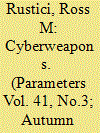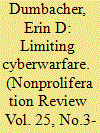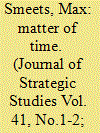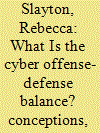| Srl | Item |
| 1 |
ID:
114711


|
|
|
| 2 |
ID:
162680


|
|
|
|
|
| Summary/Abstract |
An arms race in cyberspace is underway. US and Western government efforts to control this process have largely been limited to deterrence and norm development. This article examines an alternative policy option: arms control. To gauge whether arms-control models offer useful lessons for addressing cyber capabilities, this article compiles a new dataset of predominantly twentieth-century arms-control agreements. It also evaluates two case studies of negotiated agreements that regulate dual-use technologies, the 1928 Geneva Protocol prohibiting chemical- and biological-weapon use and the 1944 Chicago Convention on International Civil Aviation. The analysis underscores the limits of norm development for emerging technologies with both civilian and military applications. It finds lessons for developing verifiable, international cooperation mechanisms for cyberwarfare in the regulatory model of international aviation. Conventionally, arms-control agreements take advantage of transparent tests or estimates of arms. To restrict cyberwarfare activities, experts and policy makers must adapt arms-control models to a difficult-to-measure technology at an advanced stage of development and use. Further investigation of international regulatory schemes for dual-use technology of similar diffusion and development to the internet, such as international civil aviation, is needed.
|
|
|
|
|
|
|
|
|
|
|
|
|
|
|
|
| 3 |
ID:
158002


|
|
|
|
|
| Summary/Abstract |
This article examines the transitory nature of cyberweapons. Shedding light on this highly understudied facet is important both for grasping how cyberspace affects international security and policymakers’ efforts to make accurate decisions regarding the deployment of cyberweapons. First, laying out the life cycle of a cyberweapon, I argue that these offensive capabilities are both different in ‘degree’ and in ‘kind’ compared with other regarding their temporary ability to cause harm or damage. Second, I develop six propositions which indicate that not only technical features, inherent to the different types of cyber capabilities – that is, the type of exploited vulnerability, access and payload – but also offender and defender characteristics explain differences in transitoriness between cyberweapons. Finally, drawing out the implications, I reveal that the transitory nature of cyberweapons benefits great powers, changes the incentive structure for offensive cyber cooperation and induces a different funding structure for (military) cyber programs compared with conventional weapon programs. I also note that the time-dependent dynamic underlying cyberweapons potentially explains the limited deployment of cyberweapons compared to espionage capabilities.
|
|
|
|
|
|
|
|
|
|
|
|
|
|
|
|
| 4 |
ID:
153903


|
|
|
|
|
| Summary/Abstract |
Leading US military figures have discussed the use of pre-emptive cyberattack to disable or disrupt enemy nuclear missiles. While Russia does not appear to have such a highly developed concept, it now sees US plans to disrupt the command and control of its nuclear weapons as the main threat it faces at the strategic level of warfare. Cyberweapons and strategies have brought us to a situation of aggravated nuclear instability that needs to be more explicitly and openly addressed in the diplomacy of leading powers, both in private and in public. This article draws attention to a convergence between Russian interest in pre-emptive attack and reasonable views of Western strategists and scholars that the character of cyberspace favors offense and may encourage pre-emptive action. Since bilateral arms-control regimes for cyberspace are unlikely given the difficulty of verification and escalating US-Russian tension, states should commit to restraint regarding cyberattacks on nuclear military assets.
|
|
|
|
|
|
|
|
|
|
|
|
|
|
|
|
| 5 |
ID:
151073


|
|
|
|
|
| Summary/Abstract |
Most scholars and policymakers claim that cyberspace favors the offense; a minority of scholars disagree. Sweeping claims about the offense-defense balance in cyberspace are misguided because the balance can be assessed only with respect to specific organizational skills and technologies. The balance is defined in dyadic terms, that is, the value less the costs of offensive operations and the value less the costs of defensive operations. The costs of cyber operations are shaped primarily by the organizational skills needed to create and manage complex information technology efficiently. The current success of offense results primarily from poor defensive management and the relatively simpler goals of offense; it can be very costly to exert precise physical effects using cyberweapons. An empirical analysis shows that the Stuxnet cyberattacks on Iran's nuclear facilities very likely cost the offense much more than the defense. The perceived benefits of both the Stuxnet offense and defense, moreover, were likely two orders of magnitude greater than the perceived costs, making it unlikely that decisionmakers focused on costs.
|
|
|
|
|
|
|
|
|
|
|
|
|
|
|
|